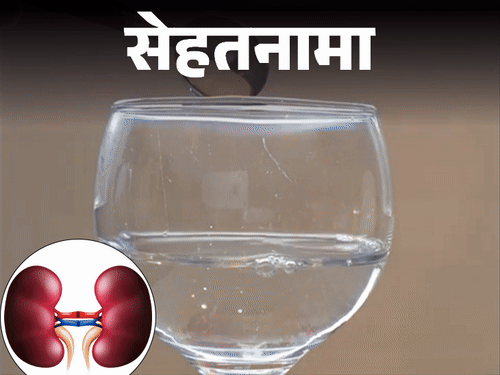2 minutes agoAuthor: Gaurav Tiwari
- copy link

According to a report of the Central Ground Water Authority, the amount of salt in Delhi’s ground water is more than normal. In the analyzed sample test, the water of more than 25% samples was found to be salty. In this case, Delhi is second after Rajasthan, where the water of 30% samples is salty.
Obviously, people generally use this water for drinking and cooking. This means that people living in these areas of Delhi and Rajasthan are getting more salt than required in their bodies.
This is not the condition of Delhi and Rajasthan alone. According to the World Health Organization (WHO), almost everyone in the world is consuming twice the amount of salt than required every day. About 19 lakh people die every year due to diseases caused by excess intake of salt.
so today ‘Health report’ I will talk about what happens when you eat too much salt. Also, we will know that-
- According to WHO, how much salt should one consume daily?
- What happens to the body when we eat excess salt?
- How can we reduce the amount of salt in our food?
People are consuming twice as much salt as needed
According to the World Health Organization, a healthy person should consume less than 5 grams of salt (less than 2000 milligrams of sodium) per day. Whereas almost everyone in the world is consuming more than 10 grams of salt per day.

According to the Indian Council of Medical Research (ICMR), an average adult in India is consuming 8 grams of salt, which is 3 grams more than the WHO standard. This is harming our health.
Millions of people die every year due to excess salt intake
A pinch of salt changes the taste of our food. A little more salt can make the food taste bad. The World Health Organization is saying that this salt is also spoiling the taste of health.
Eating too much salt can cause high blood pressure. It can also increase the risk of heart disease, gastric cancer and kidney disease. All these diseases invite death.

Excess salt is the enemy of heart and kidney
- Eating too much salt increases the amount of sodium in our blood. The body needs more water to dilute it. Drinking too much water increases the volume of blood. This increases the pressure on the blood vessels and the heart.
- Our body knows that extra salt is harmful for the body. Therefore, the kidney immediately starts filtering it to balance it. It has to work extra hard in this task. Doubling the amount of salt means that its work also doubles. When the kidney gets tired while working, it leaves the salt in the blood.
- This increases the volume of blood. Blood pressure increases. In this condition, the heart has to work harder for pumping. As a result, the risk of heart disease and stroke increases.
- This can cause kidney stones and also increases the risk of kidney disease.

According to naturopathy, our entire food should come from plants. However, the salt we use in our food does not come from plants. For good health, we will have to stop eating salt or eat it as little as possible.
It is necessary to reduce salt in food
We are constantly talking about the fact that there is more salt in our food than required. In such a situation, this question must be coming to your mind that while eating, the amount of salt does not seem to be much. This is because our taste buds have developed with high salt food since childhood. That is why it seems normal to us. Whereas it is more than the body’s requirement and is continuously harming us.
If the use of salt is gradually reduced in the daily diet, there will not be much difference in the taste and one will also get used to the taste. Wafers, ketchup and sauces contain more salt than food. Apart from this, fast food also contains a lot of salt. Therefore, it is necessary to avoid them first.
Understand in the graphic what 5 things need to be kept in mind for this.

Vegetables and pulses already contain salt
- We do not need to add salt to vegetables or pulses. Salt is naturally present in them. Actually, nature prepares everything in such a way that we do not need to add anything to it. Despite this, if we have to add something for taste, then we can add herbs like coriander, oregano.
- We get all the salt we need to stay healthy from fruits and vegetables. Understand it this way, if someone eats half a kilo of fruits and vegetables a day, then it fulfills the salt requirement of our body.
- Eating salad can be a good option for this. You can add cucumber, kachori, tomato, carrot and seasonal fruits in it. All these things contain sufficient salt.
- Include green leafy vegetables, spinach, cabbage, cauliflower, onion, tomato etc. in your diet. These also contain salt. Similarly, pulses also contain salt naturally.



